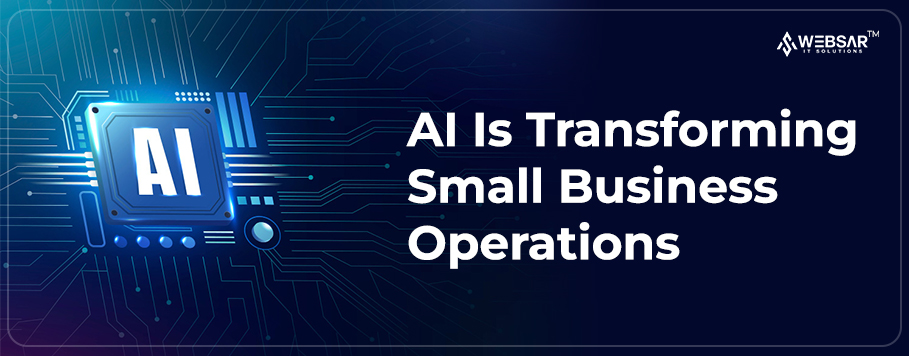In today's fast-paced digital economy, Artificial Intelligence (AI) is no longer a futuristic concept. It's already here, reshaping the way small businesses operate, compete, and grow. From AI automation and predictive analytics to customer service chatbots and smart inventory systems, AI solutions are helping entrepreneurs streamline their processes and make more informed decisions.
Whether you're running a local bakery or a growing tech startup, AI technology can be a game-changer. This blog dives into how AI is transforming small business operations, highlighting its most impactful applications, and how It companies and AI software providers are making it accessible to small and medium-sized enterprises (SMEs).
1. Smarter Decision-Making with AI and ML Algorithms
AI for businesses goes far beyond just automating repetitive tasks. With powerful machine learning (ML) algorithms, AI technology enables small businesses to make data-driven decisions. Supervised learning, a subset of machine learning, allows systems to analyze historical data and predict outcomes. This is invaluable for businesses looking to forecast sales, manage supply chains, or optimize marketing campaigns. For instance, a small e-commerce store can use AI software to predict which products will trend next season, helping them stay ahead of the curve.
Neural networks, inspired by the human brain, allow AI systems to identify complex patterns in data. These deep learning models can analyze customer behavior, detect fraud, and even personalize user experiences, helping small businesses offer services that rival large enterprises.
2. Enhancing Customer Experiences with AI Automation
Customers expect fast, personalized, and efficient service. AI development has led to the rise of virtual assistants and chatbots that provide 24/7 support. These AI-powered tools can answer FAQs, book appointments, recommend products, and escalate issues when needed.
AI automation in customer service not only improves response times but also reduces operational costs. For example, a small wellness clinic using AI solutions can automate appointment scheduling and follow-up reminders, freeing up staff for more critical tasks.
Furthermore, AI software integrated with CRM systems helps track customer preferences and interactions, enabling more personalized outreach. This is particularly beneficial for It solutions companies and service providers looking to build long-term client relationships.
3. Optimizing Operations and Inventory Management
Small businesses often struggle with resource management. With AI technology, managing inventory becomes more accurate and efficient. Deep learning algorithms analyze sales trends, seasonality, and supplier lead times to maintain optimal stock levels. For example, a retail store can use AI for businesses to automate reordering, minimizing both stockouts and overstocking. AI automation also assists in detecting supply chain inefficiencies and suggesting improvements, something even larger It companies are investing in heavily. AI software tools also monitor equipment and machinery for predictive maintenance. This is especially useful for manufacturing startups and service providers relying on uninterrupted operations.
4. Boosting Marketing and Sales Efforts
AI development has revolutionized digital marketing. Small businesses can now access powerful marketing tools previously exclusive to large corporations. AI software can analyze customer data to segment audiences, optimize ad placements, and personalize marketing messages. With supervised learning and deep learning, businesses can predict which customers are more likely to convert and when.
AI for businesses allows for real-time insights and campaign adjustments. Whether you're a boutique, a software development services provider, or an It software solutions company, AI-powered marketing helps you reach the right audience at the right time.
5. Strengthening Security and Fraud Detection
Cybersecurity is a growing concern for small businesses, especially those operating online or managing customer data. AI automation can help identify suspicious activities and potential breaches before they escalate. Neural networks and other AI technologies can monitor login behavior, payment patterns, and access requests to detect anomalies. This not only helps prevent fraud but also builds trust with customers. Many It services providers and It companies in Maharashtra are now offering AI-based security solutions tailored for SMEs, helping them protect sensitive information without investing in large in-house IT teams.
6. Making AI Accessible to Small Businesses
Until recently, AI technology seemed out of reach for small businesses due to high costs and complexity. However, thanks to advances in cloud computing and the rise of AI software-as-a-service (AI SaaS), even small enterprises can now afford sophisticated AI tools. Today, it companies and software development services are creating tailored AI solutions for industries ranging from healthcare to retail. It solutions companies are also offering integration services, helping small businesses embed AI tools into their existing workflows. Web business tech is evolving quickly, and staying competitive means leveraging the latest innovations. AI for businesses isn’t just a trend—it’s a necessity.
Conclusion
Artificial Intelligence (AI) is no longer reserved for tech giants. With the rise of accessible AI software and the support of it companies in Maharashtra and beyond, small businesses can harness AI to improve decision-making, streamline operations, enhance customer experiences, and drive growth. From deep learning and neural networks to supervised learning and AI automation, the potential is immense. As AI development continues to evolve, now is the time for small business owners to explore how these technologies can benefit their operations.
If you're a business owner looking to stay competitive, it’s worth consulting with a trusted it software company to explore your AI options. After all, in today’s digital age, those who embrace innovation will lead the way.

